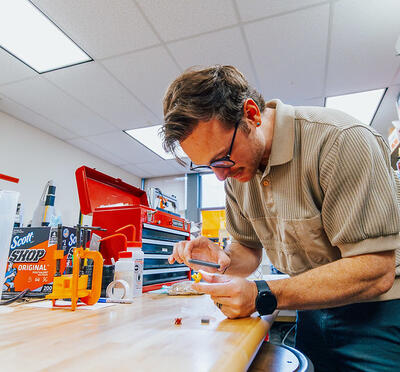Although Bridger Cook is just beginning his graduate studies in mechanical engineering after taking courses through Oregon State University’s Accelerated Master’s Platform, he started to prepare years ago as an energy systems engineering undergraduate at OSU-Cascades in Bend. Among his most formative early experiences was an internship with Energy Trust of Oregon during the summer of his second year.
“There’s a program with Energy Trust called Strategic Energy Management,” Cook said. “It’s the State of Oregon trying to encourage people to be smarter about the way that they use power. So, Linn County hired me to do that for them.”
Cook’s first taste of monitoring energy systems during the internship was tracking usage of heating and cooling equipment in county offices. Analyzing data from Pacific Power accounts, he was able to identify and rectify excessive energy leaks — air conditioning units running on weekends, boilers left on all summer, and faulty equipment that wouldn’t turn off. Cook now uses the same method to track his own energy consumption.
The following term, he took a course in fluid mechanics. His interactions with the instructor, Rebecca Webb, encouraged him to further his education.
“The way that Dr. Webb was describing her experience with graduate work, it just sounded super fun. So, I talked to her about graduate degrees, and the more I talked to her, the more I realized that I wanted to do one,” Cook said.
Feeling energized, he took the initiative to approach Chris Hagen, who manages the Oregon State-Cascades Energy Systems Laboratory, to express his interest in conducting research. Hagen had a project on deck just waiting for the right student to work on it: improving the flight range of drones. The project would go on to last two years.
“Dr. Chris Hagen took me under his wing, and I started doing work on two-stroke engines. His idea was to attach those to a drone and extend their flight range rather than focus on extending the battery’s range,” Cook explained.
Then, still hungry for more research experience during the first summer of the pandemic, Cook connected with Christophe Lanaud. The energy systems engineering instructor involved him on a project using machine learning to help regulate wind power grids, which could lead to lower-cost energy efficiency.
“The idea with machine learning is we just take a whole bunch of data and shove it into a computer,” Cook explained. “The computer could get pretty good at guessing. So, we can look and say, hey, tomorrow we’re not going to have enough wind, so we can pump a little bit more coal through, or tomorrow we’re going to have way too much wind, maybe cut back.”
Wrapping up an enriching undergraduate experience, Cook began searching for graduate school options during his fourth year. While he applied to programs in both Montana and Washington, one institution was clearly the frontrunner for the Dallas, Oregon, native.
“Oregon State stood out because the school is super close to my family, and I know the professors here. I really liked working with Dr. Hagen; he offered me the opportunity to keep working with him. Near the end of my senior year, we had kind of nailed down that that was the route I was going to go, and he brought up the accelerated master’s,” Cook said.
Wasting no time, Cook enrolled in some graduate courses during his final term at Cascades and worked with Hagen on a hydrogen storage project in the summer of 2021. Specifically, Cook studied control schemes for both half-hydrogen and half-battery storage systems to determine contexts in which each system would be most efficient.
His master’s thesis, being conducted at the Corvallis campus, will focus on wood energy and its potential applications. To this end, Cook received $40,000 in funding from the U.S. Department of Agriculture Sun Grant Program, which promotes initiatives in bio-based energy and environmental sustainability.
“The state’s been thinning forests, trying to keep fires from getting so out of control, and then what they do with all that residue is they just burn it. But it also has a whole bunch of emissions, and it’s bad for the soil and just a waste,” Cook explained. “People don’t really use that in boilers or anything, because it’s so expensive to get it from the forest. My project is going to look at different things you can do to that wood to make it more economically attractive.”
Cook relishes his graduate courses so far and looks forward to those in the coming terms. He has already started thinking about future opportunities, too; besides wood, he’s captivated by new, cutting-edge technology in alternative energy usage and storage.
“I think the next big thing is what they call thin-film solar. Imagine Saran wrap solar panels, and they’re saying if you can make solar panels that thin, you can put them on windows as tinting. You can make them in paint on cars, and cars recharge themselves. You can literally have energy wherever you are. I think that’s where we're going next,” he said.
No matter where Cook goes next, his potential to better our environment is limitless.



